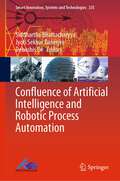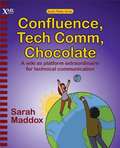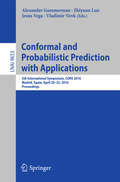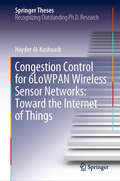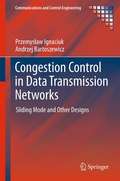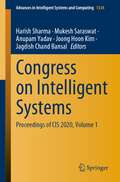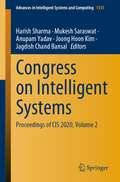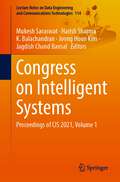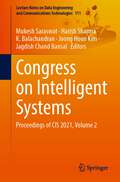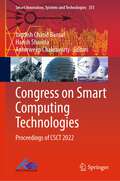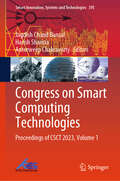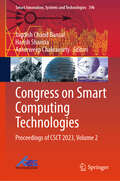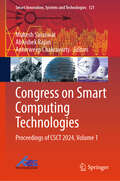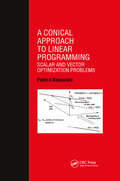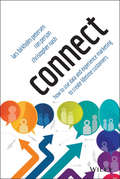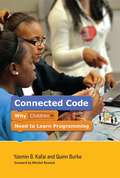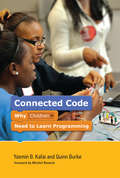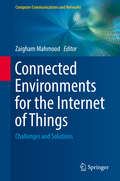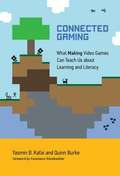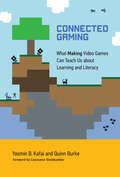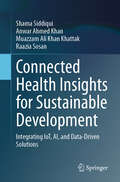- Table View
- List View
Confluence of Artificial Intelligence and Robotic Process Automation (Smart Innovation, Systems and Technologies #335)
by Debashis De Siddhartha Bhattacharyya Jyoti Sekhar BanerjeeThis book provides a detailed insight into Robotic Process Automation (RPA) technologies linked with AI that will help organizations implement Industry 4.0 procedures. RPA tools enhance their functionality by incorporating AI objectives, such as use of artificial neural network algorithms, text mining techniques, and natural language processing techniques for information extraction and the subsequent process of optimization and forecasting scenarios for the purpose of improving an organization's operational and business processes. The target readers of this book are researchers, professors, graduate students, scientists, policymakers, professionals, and developers working in the IT and ITeS sectors, i.e. people who are working on emerging technologies. This book also provides insights and decision support tools necessary for executives concerned with different industrial and organizational automation-centric jobs, knowledge dissemination, information, and policy development for automation in different educational, government, and non-government organizations. This book is of special interest to college and university educators who teach AI, machine learning, blockchain, business intelligence, cognitive intelligence, and brain intelligence courses in different capacities.
Confluence, Tech Comm, Chocolate
by Sarah MaddoxWeb and Tech Comm guru Sarah Maddox takes you inside the Confluence wiki for an in-depth guide to developing and publishing technical documentation on a wiki. She looks at life on a wiki from the points of view of both technical writers and readers. Confluence, Tech Comm, Chocolate shows you how to make your wiki fly.While it focuses on Confluence, the concepts and strategies can be used with any wiki. The basic message is that technical documentation becomes true communication when you add the social and collaborative tools that a wiki provides.Inside the Book Introduction Developing Technical Documentation on a Wiki Life on a Wiki Giving Your Wiki Wings Glossary and Index
Conformal Geometry: Computational Algorithms And Engineering Applications (Advanced Lectures In Mathematics Ser.)
by Ying He Miao Jin Xianfeng Gu Yalin WangThis book offers an essential overview of computational conformal geometry applied to fundamental problems in specific engineering fields. It introduces readers to conformal geometry theory and discusses implementation issues from an engineering perspective.The respective chapters explore fundamental problems in specific fields of application, and detail how computational conformal geometric methods can be used to solve them in a theoretically elegant and computationally efficient way. The fields covered include computer graphics, computer vision, geometric modeling, medical imaging, and wireless sensor networks. Each chapter concludes with a summary of the material covered and suggestions for further reading, and numerous illustrations and computational algorithms complement the text.The book draws on courses given by the authors at the University of Louisiana at Lafayette, the State University of New York at Stony Brook, and Tsinghua University, and will be of interest to senior undergraduates, graduates and researchers in computer science, applied mathematics, and engineering.
Conformal and Probabilistic Prediction with Applications: 5th International Symposium, COPA 2016, Madrid, Spain, April 20-22, 2016, Proceedings (Lecture Notes in Computer Science #9653)
by Alexander Gammerman Zhiyuan Luo Jesús Vega Vladimir VovkThis book constitutes the refereed proceedings of the 5th InternationalSymposium on Conformal and Probabilistic Prediction with Applications, COPA2016, held in Madrid, Spain, in April 2016. The 14 revised fullpapers presented together with 1 invited paper were carefully reviewed andselected from 23 submissions and cover topics on theory of conformal prediction; applicationsof conformal prediction; and machine learning.
Confronting Cyberespionage Under International Law (Routledge Research in International Law)
by Oğuz Kaan PehlivanWe have witnessed a digital revolution that affects the dynamics of existing traditional social, economic, political and legal systems. This revolution has transformed espionage and its features, such as its purpose and targets, methods and means, and actors and incidents, which paves the way for the emergence of the term cyberespionage. This book seeks to address domestic and international legal tools appropriate to adopt in cases of cyberespionage incidents. Cyberespionage operations of state or non-state actors are a kind of cyber attack, which violates certain principles of international law but also constitute wrongful acquisition and misappropriation of the data. Therefore, from the use of force to state responsibility, international law offers a wide array of solutions; likewise, domestic regulations through either specialized laws or general principles stipulate civil and criminal remedies against cyberespionage. Confronting Cyberespionage Under International Law examines how espionage and its applications have transformed since World War II and how domestic and international legal mechanisms can provide effective legal solutions to this change, hindering the economic development and well-being of individuals, companies and states to the detriment of others. It shows the latest state of knowledge on the topic and will be of interest to researchers, academics, legal practitioners, legal advisors and students in the fields of international law, information technology law and intellectual property law.
Confronting the Internet’s Dark Side
by Raphael Cohen-AlmagorTerrorism, cyberbullying, child pornography, hate speech, cybercrime: along with unprecedented advancements in productivity and engagement, the Internet has ushered in a space for violent, hateful, and antisocial behavior. How do we, as individuals and as a society, protect against dangerous expressions online? Confronting the Internet's Dark Side is the first book on social responsibility on the Internet. It aims to strike a balance between the free speech principle and the responsibilities of the individual, corporation, state, and the international community. This book brings a global perspective to the analysis of some of the most troubling uses of the Internet. It urges net users, ISPs, and liberal democracies to weigh freedom and security, finding the golden mean between unlimited license and moral responsibility. This judgment is necessary to uphold the very liberal democratic values that gave rise to the Internet and that are threatened by an unbridled use of technology.
Congestion Control for 6LoWPAN Wireless Sensor Networks: Toward the Internet of Things (Springer Theses)
by Hayder Al-KashoashThe Internet of Things (IoT) is the next big challenge for the research community. The IPv6 over low power wireless personal area network (6LoWPAN) protocol stack is considered a key part of the IoT. In 6LoWPAN networks, heavy network traffic causes congestion which significantly degrades network performance and impacts on quality of service aspects. This book presents a concrete, solid and logically ordered work on congestion control for 6LoWPAN networks as a step toward successful implementation of the IoT and supporting the IoT application requirements. The book addresses the congestion control issue in 6LoWPAN networks and presents a comprehensive literature review on congestion control for WSNs and 6LoWPAN networks. An extensive congestion analysis and assessment for 6LoWPAN networks is explored through analytical modelling, simulations and real experiments. A number of congestion control mechanisms and algorithms are proposed to mitigate and solve the congestion problem in 6LoWPAN networks by using and utilizing the non-cooperative game theory, multi-attribute decision making and network utility maximization framework. The proposed algorithms are aware of node priorities and application priorities to support the IoT application requirements and improve network performance in terms of throughput, end-to-end delay, energy consumption, number of lost packets and weighted fairness index.
Congestion Control in Data Transmission Networks: Sliding Mode and Other Designs (Communications and Control Engineering)
by Andrzej Bartoszewicz Przemysław IgnaciukCongestion Control in Data Transmission Networks details the modeling and control of data traffic in communication networks. It shows how various networking phenomena can be represented in a consistent mathematical framework suitable for rigorous formal analysis. The monograph differentiates between fluid-flow continuous-time traffic models, discrete-time processes with constant sampling rates, and sampled-data systems with variable discretization periods. The authors address a number of difficult real-life problems, such as: optimal control of flows with disparate, time-varying delay; the existence of source and channel nonlinearities; the balancing of quality of service and fairness requirements; and the incorporation of variable rate allocation policies. Appropriate control mechanisms which can handle congestion and guarantee high throughput in various traffic scenarios (with different networking phenomena being considered) are proposed. Systematic design procedures using sound control-theoretic foundations are adopted. Since robustness issues are of major concern in providing efficient data-flow regulation in today's networks, sliding-mode control is selected as the principal technique to be applied in creating the control solutions. The controller derivation is given extensive analytical treatment and is supported with numerous realistic simulations. A comparison with existing solutions is also provided. The concepts applied are discussed in a number of illustrative examples, and supported by many figures, tables, and graphs walking the reader through the ideas and introducing their relevance in real networks. Academic researchers and graduate students working in computer networks and telecommunications and in control (especially time-delay systems and discrete-time optimal and sliding-mode control) will find this text a valuable assistance in ensuring smooth data-flow within communications networks.
Congress on Intelligent Systems: Proceedings of CIS 2020, Volume 1 (Advances in Intelligent Systems and Computing #1334)
by Anupam Yadav Jagdish Chand Bansal Joong Hoon Kim Harish Sharma Mukesh SaraswatThis book is a collection of selected papers presented at the First Congress on Intelligent Systems (CIS 2020), held in New Delhi, India during September 5 – 6, 2020. It includes novel and innovative work from experts, practitioners, scientists and decision-makers from academia and industry. It covers topics such as Internet of Things, information security, embedded systems, real-time systems, cloud computing, big data analysis, quantum computing, automation systems, bio-inspired intelligence, cognitive systems, cyber physical systems, data analytics, data/web mining, data science, intelligence for security, intelligent decision making systems, intelligent information processing, intelligent transportation, artificial intelligence for machine vision, imaging sensors technology, image segmentation, convolutional neural network, image/video classification, soft computing for machine vision, pattern recognition, human computer interaction, robotic devices and systems, autonomous vehicles, intelligent control systems, human motor control, game playing, evolutionary algorithms, swarm optimization, neural network, deep learning, supervised learning, unsupervised learning, fuzzy logic, rough sets, computational optimization, and neuro fuzzy systems.
Congress on Intelligent Systems: Proceedings of CIS 2020, Volume 2 (Advances in Intelligent Systems and Computing #1335)
by Anupam Yadav Jagdish Chand Bansal Joong Hoon Kim Harish Sharma Mukesh SaraswatThis book is a collection of selected papers presented at the First Congress on Intelligent Systems (CIS 2020), held in New Delhi, India, during September 5–6, 2020. It includes novel and innovative work from experts, practitioners, scientists, and decision-makers from academia and industry. It covers topics such as Internet of Things, information security, embedded systems, real-time systems, cloud computing, big data analysis, quantum computing, automation systems, bio-inspired intelligence, cognitive systems, cyber physical systems, data analytics, data/web mining, data science, intelligence for security, intelligent decision making systems, intelligent information processing, intelligent transportation, artificial intelligence for machine vision, imaging sensors technology, image segmentation, convolutional neural network, image/video classification, soft computing for machine vision, pattern recognition, human–computer interaction, robotic devices and systems, autonomous vehicles, intelligent control systems, human motor control, game playing, evolutionary algorithms, swarm optimization, neural network, deep learning, supervised learning, unsupervised learning, fuzzy logic, rough sets, computational optimization, and neuro-fuzzy systems.
Congress on Intelligent Systems: Proceedings of CIS 2021, Volume 1 (Lecture Notes on Data Engineering and Communications Technologies #114)
by K. Balachandran Jagdish Chand Bansal Joong Hoon Kim Harish Sharma Mukesh SaraswatThis book is a collection of selected papers presented at the Second Congress on Intelligent Systems (CIS 2021), organized by Soft Computing Research Society and CHRIST (Deemed to be University), Bengaluru, India, during September 4 – 5, 2021. It includes novel and innovative work from experts, practitioners, scientists, and decision-makers from academia and industry. It covers topics such as Internet of things, information security, embedded systems, real-time systems, cloud computing, big data analysis, quantum computing, automation systems, bio-inspired intelligence, cognitive systems, cyber physical systems, data analytics, data/web mining, data science, intelligence for security, intelligent decision making systems, intelligent information processing, intelligent transportation, artificial intelligence for machine vision, imaging sensors technology, image segmentation, convolutional neural network, image/video classification, soft computing for machine vision, pattern recognition, human–computer interaction, robotic devices and systems, autonomous vehicles, intelligent control systems, human motor control, game playing, evolutionary algorithms, swarm optimization, neural network, deep learning, supervised learning, unsupervised learning, fuzzy logic, rough sets, computational optimization, and neuro-fuzzy systems.
Congress on Intelligent Systems: Proceedings of CIS 2021, Volume 2 (Lecture Notes on Data Engineering and Communications Technologies #111)
by K. Balachandran Jagdish Chand Bansal Joong Hoon Kim Harish Sharma Mukesh SaraswatThis book is a collection of selected papers presented at the Second Congress on Intelligent Systems (CIS 2021), organized by Soft Computing Research Society and CHRIST (Deemed to be University), Bengaluru, India during September 4 – 5, 2021. It includes novel and innovative work from experts, practitioners, scientists and decision-makers from academia and industry. It covers topics such as Internet of Things, information security, embedded systems, real-time systems, cloud computing, big data analysis, quantum computing, automation systems, bio-inspired intelligence, cognitive systems, cyber physical systems, data analytics, data/web mining, data science, intelligence for security, intelligent decision making systems, intelligent information processing, intelligent transportation, artificial intelligence for machine vision, imaging sensors technology, image segmentation, convolutional neural network, image/video classification, soft computing for machine vision, pattern recognition, human computer interaction, robotic devices and systems, autonomous vehicles, intelligent control systems, human motor control, game playing, evolutionary algorithms, swarm optimization, neural network, deep learning, supervised learning, unsupervised learning, fuzzy logic, rough sets, computational optimization, and neuro fuzzy systems.
Congress on Smart Computing Technologies: Proceedings of CSCT 2022 (Smart Innovation, Systems and Technologies #351)
by Jagdish Chand Bansal Harish Sharma Antorweep ChakravortyThis book presents high-quality research papers presented at Congress on Smart Computing Technologies (CSCT 2022) organized by SAU Center for Research and Innovative Learning (SCRIL), South Asian University, India, from 3–4 December 2022. The book extensively covers recent research in algorithms for smart computing, AI and machine learning in smart computing, edge computing algorithms, adversarial networks and autoencoders, data visualization, data mining, data analytics, machine learning, game theory, high-performance computing, mobile and ubiquitous platforms for smart environments, cloud/edge/fog computing technologies for smart systems, Internet of Things (IoT) and industrial IoT technologies for smart systems, smart device and hardware, security, privacy, and economics in smart environments, big data, healthcare informatics, smart precision agriculture, smart transportation, social network analysis, and human–computer interaction.
Congress on Smart Computing Technologies: Proceedings of CSCT 2023, Volume 1 (Smart Innovation, Systems and Technologies #395)
by Jagdish Chand Bansal Harish Sharma Antorweep ChakravortyThis book presents high-quality research papers presented at Congress on Smart Computing Technologies (CSCT 2023) organized by SAU Center for Research and Innovative Learning (SCRIL), South Asian University, India, from 2–3 December 2023. The book extensively covers recent research in algorithms for smart computing, AI and machine learning in smart computing, edge computing algorithms, adversarial networks and autoencoders, data visualization, data mining, data analytics, machine learning, game theory, high-performance computing, mobile and ubiquitous platforms for smart environments, cloud/edge/fog computing technologies for smart systems, Internet of Things (IoT) and industrial IoT technologies for smart systems, smart device and hardware, security, privacy, and economics in smart environments, big data, healthcare informatics, smart precision agriculture, smart transportation, social network analysis, and human–computer interaction. The work is presented in two volumes.
Congress on Smart Computing Technologies: Proceedings of CSCT 2023, Volume 2 (Smart Innovation, Systems and Technologies #396)
by Jagdish Chand Bansal Harish Sharma Antorweep ChakravortyThis book presents high-quality research papers presented at Congress on Smart Computing Technologies (CSCT 2023) organized by SAU Center for Research and Innovative Learning (SCRIL), South Asian University, India, from 2–3 December 2023. The book extensively covers recent research in algorithms for smart computing, AI and machine learning in smart computing, edge computing algorithms, adversarial networks and autoencoders, data visualization, data mining, data analytics, machine learning, game theory, high-performance computing, mobile and ubiquitous platforms for smart environments, cloud/edge/fog computing technologies for smart systems, Internet of Things (IoT) and industrial IoT technologies for smart systems, smart device and hardware, security, privacy, and economics in smart environments, big data, healthcare informatics, smart precision agriculture, smart transportation, social network analysis, and human–computer interaction. The work is presented in two volumes.
Congress on Smart Computing Technologies: Proceedings of CSCT 2024, Volume 1 (Smart Innovation, Systems and Technologies #121)
by Mukesh Saraswat Antorweep Chakravorty Abhishek RajanThis book presents high-quality research papers presented at Congress on Smart Computing Technologies (CSCT 2024) organized by Soft Computing Research Society (SCRS), held at National Institute of Technology Sikkim from 14 to 15 December 2024. The book extensively covers recent research in algorithms for smart computing, AI and machine learning in smart computing, edge computing algorithms, adversarial networks and autoencoders, data visualization, data mining, data analytics, machine learning, game theory, high-performance computing, mobile and ubiquitous platforms for smart environments, cloud/edge/fog computing technologies for smart systems, Internet of Things (IoT) and industrial IoT technologies for smart systems, smart device and hardware, security, privacy, and economics in smart environments, big data, healthcare informatics, smart precision agriculture, smart transportation, social network analysis, and human–computer interaction. The book is presented in two volumes
Congressional Communication in the Digital Age (Routledge Research in American Politics and Governance)
by Jocelyn Evans Jessica M. HaydenCommunication defines political representation. At the core of the representational relationship lies the interaction between principal and agent; the quality of this relationship is predicated upon the accessibility of effective channels of communication between the constituent and representative. Over the past decade, congressional websites have become the primary way constituents communicate with their members and a prominent place for members to communicate with constituents. Yet, as we move toward the third decade of the 21st century, little work has systematically analyzed this forum as a distinct representational space. In this book, Jocelyn Evans and Jessica Hayden offer a fresh, timely, and mixed-methods approach for understanding how the emergence of virtual offices has changed the representational relationship between constituents and members of Congress. Utilizing strong theoretical foundations, a broad historical perspective, elite interviews, and rich original datasets, Evans and Hayden present evidence that virtual offices operate as a distinct representational space, and they demonstrate that their use has resulted in unprecedented and ill-understood changes in representational behavior. Congressional Communication in the Digital Age contributes to the scholarship on representation theory and its application to the contemporary Congress. It is valuable reading for students and researchers interested in American politics, political communication, and legislative politics.
Conical Approach to Linear Programming
by P D'AlessandroThe conical approach provides a geometrical understanding of optimization and is a powerful research tool and useful problem-solving technique (for example, in decision support and real time control applications). Conical optimality conditions are first stated in a very general optimization framework, and then applied to linear programming. A complete theory along with primal and dual algorithms is given, and solutions and algorithms are also provided for vector and robust linear optimization. The advantages of parameter dependence of conical methods are fully discussed. In addition to numerical results, the book provides source codes and detailed documentation of a Modula-2 implementation for the main algorithms.
Connect: How to Use Data and Experience Marketing to Create Lifetime Customers
by Ron Person Lars Birkholm Petersen Christopher NashConnect and engage across channels with the new customers Connect is the ultimate marketing guide to becoming more relevant, effective, and successful within the new marketplace. Written by a team of marketing experts serving Fortune 500 brands, this book outlines the massive paradigm shift currently taking place within the industry, and provides the insight and perspective marketers need to stay on board. Readers will find guidance toward reaching a customer base that sees marketers as an unnecessary annoyance, and strategies for engaging those customers at touch points throughout the customer lifecycle. The book's scope encompasses both digital and real-life avenues, discussing the new ways of thinking and the new tools and processes that allow marketers to function in the new era where digital customer experiences are increasingly important. Marketing is undergoing a revolution to rival the impact of Gutenberg's printing press. Customers are in control, with more choice and more access than ever before, and they refuse to be "sold to" or "managed." Many marketing professionals are flailing for a new strategy while the winners are clearly jumping ahead - Connect takes readers inside the winners' world to learn the approach that's engaging the new consumer. Discover the technology and processes that allow marketers to remain relevant Craft a personal, relevant, and accessible customer journey that engages the connected customer Keep in touch throughout the customer's life cycle, both online and offline Link digital goals and metrics to business objectives for a more relevant strategy Smart marketers have moved to a higher level that achieves business objectives while increasing relevance to the customer. Connect provides readers a roadmap to this new approach, and the tools that make it work.
Connected Code
by Yasmin B. Kafai Mitchel Resnick Quinn BurkeCoding, once considered an arcane craft practiced by solitary techies, is now recognized by educators and theorists as a crucial skill, even a new literacy, for all children. Programming is often promoted in K-12 schools as a way to encourage "computational thinking" -- which has now become the umbrella term for understanding what computer science has to contribute to reasoning and communicating in an ever-increasingly digital world.In Connected Code, Yasmin Kafai and Quinn Burke argue that although computational thinking represents an excellent starting point, the broader conception of "computational participation" better captures the twenty-first-century reality. Computational participation moves beyond the individual to focus on wider social networks and a DIY culture of digital "making." Kafai and Burke describe contemporary examples of computational participation: students who code not for the sake of coding but to create games, stories, and animations to share; the emergence of youth programming communities; the practices and ethical challenges of remixing (rather than starting from scratch); and the move beyond stationary screens to programmable toys, tools, and textiles.
Connected Code: Why Children Need to Learn Programming (The John D. and Catherine T. MacArthur Foundation Series on Digital Media and Learning)
by Yasmin B. Kafai Quinn BurkeWhy every child needs to learn to code: the shift from “computational thinking” to computational participation.Coding, once considered an arcane craft practiced by solitary techies, is now recognized by educators and theorists as a crucial skill, even a new literacy, for all children. Programming is often promoted in K-12 schools as a way to encourage “computational thinking”—which has now become the umbrella term for understanding what computer science has to contribute to reasoning and communicating in an ever-increasingly digital world.In Connected Code, Yasmin Kafai and Quinn Burke argue that although computational thinking represents an excellent starting point, the broader conception of “computational participation” better captures the twenty-first-century reality. Computational participation moves beyond the individual to focus on wider social networks and a DIY culture of digital “making.”Kafai and Burke describe contemporary examples of computational participation: students who code not for the sake of coding but to create games, stories, and animations to share; the emergence of youth programming communities; the practices and ethical challenges of remixing (rather than starting from scratch); and the move beyond stationary screens to programmable toys, tools, and textiles.
Connected Environments for the Internet of Things: Challenges and Solutions (Computer Communications and Networks)
by Zaigham MahmoodThis comprehensive text/reference presents a broad-ranging overview of device connectivity in distributed computing environments, supporting the vision of an Internet of Things (IoT). Expert perspectives are provided by an international selection of researchers from both industry and academia, covering issues of communication, security, privacy, interoperability, networking, access control, and authentication. In addition to discussing state-of-the-art research and practice, the book includes corporate analyses offering a balanced view of benefits and limitations, and numerous case studies illustrating the challenges and practical solutions. Topics and features: discusses issues of security and privacy in connected environments, with a specific focus on the impact of the IoT paradigm on enterprise information systems; examines the challenges of managing big data in IoT environments, and proposes cloud computing-based solutions to the limitations inherent in the IoT paradigm; suggests approaches to overcome service-level interoperability problems in the IoT environment; introduces a mobile IoT simulator designed to evaluate the behavior of IoT systems, in addition to a novel approach to manage hyper-connectivity in the IoT; describes the use of the Essence framework to model software development methods, and highlights the benefits of integrating data from smart buildings and IoT devices; presents an asymmetric schema matching mechanism for IoT interoperability, and explores the topic of automatic provenance capture at the middleware level; reviews emerging network topologies and communication technologies, and advises on the adoption of a data distribution service as a middleware platform for IoT systems. This practically-oriented volume serves as a complete reference for students, researchers and practitioners of distributed computing, providing insights into the latest approaches, technologies, and frameworks relevant to the IoT environment.
Connected Gaming: What Making Video Games Can Teach Us about Learning and Literacy
by Constance Steinkuehler Yasmin B. Kafai Quinn BurkeOver the last decade, video games designed to teach academic content have multiplied. Students can learn about Newtonian physics from a game or prep for entry into the army. An emphasis on the instructionist approach to gaming, however, has overshadowed the constructionist approach, in which students learn by designing their own games themselves. In this book, Yasmin Kafai and Quinn Burke discuss the educational benefits of constructionist gaming -- coding, collaboration, and creativity -- and the move from "computational thinking" toward "computational participation." Kafai and Burke point to recent developments that support a shift to game making from game playing, including the game industry's acceptance, and even promotion, of "modding" and the growth of a DIY culture. Kafai and Burke show that student-designed games teach not only such technical skills as programming but also academic subjects. Making games also teaches collaboration, as students frequently work in teams to produce content and then share their games with in class or with others online. Yet Kafai and Burke don't advocate abandoning instructionist for constructionist approaches. Rather, they argue for a more comprehensive, inclusive idea of connected gaming in which both making and gaming play a part.
Connected Gaming: What Making Video Games Can Teach Us about Learning and Literacy (The John D. and Catherine T. MacArthur Foundation Series on Digital Media and Learning)
by Yasmin B. Kafai Quinn BurkeHow making and sharing video games offer educational benefits for coding, collaboration, and creativity.Over the last decade, video games designed to teach academic content have multiplied. Students can learn about Newtonian physics from a game or prep for entry into the army. An emphasis on the instructionist approach to gaming, however, has overshadowed the constructionist approach, in which students learn by designing their own games themselves. In this book, Yasmin Kafai and Quinn Burke discuss the educational benefits of constructionist gaming—coding, collaboration, and creativity—and the move from “computational thinking” toward “computational participation.” Kafai and Burke point to recent developments that support a shift to game making from game playing, including the game industry's acceptance, and even promotion, of “modding” and the growth of a DIY culture. Kafai and Burke show that student-designed games teach not only such technical skills as programming but also academic subjects. Making games also teaches collaboration, as students frequently work in teams to produce content and then share their games with in class or with others online. Yet Kafai and Burke don't advocate abandoning instructionist for constructionist approaches. Rather, they argue for a more comprehensive, inclusive idea of connected gaming in which both making and gaming play a part.
Connected Health Insights for Sustainable Development: Integrating IoT, AI, and Data-Driven Solutions
by Shama Siddiqui Anwar Ahmed Khan Muazzam Ali Khan Khattak Raazia SosanThis book offers a comprehensive look at how emerging technologies like IoT, Data Science, and AI can drive significant advancements in healthcare, particularly in alignment with Sustainable Development Goal 3 (SDG 3) – Good Health and Well-Being. By bridging technological innovation with the critical need for improved healthcare systems, this book explores how these technologies are revolutionizing both personal and population health management. Readers will gain insights into how IoT-enabled devices, AI-powered analytics, and data-driven decision-making tools enhance everything from continuous patient monitoring to personalized medicine and resource optimization for governments. The initial chapters provide a foundational understanding of IoT, AI, and Data Science, followed by in-depth discussions on their integration into healthcare applications. Key topics include continuous health monitoring through wearable technologies, the role of mobile health (m-Health) in making healthcare more accessible, and the use of advanced analytics in diagnosing diseases early. Personalized medicine is explored as a pivotal breakthrough in improving patient outcomes by leveraging data from IoT devices and AI-driven models to tailor treatment plans. Further, the book also covers the advancements in medical imaging and how it supports real-time diagnosis and treatment. Towards the latter part, the book delves into population health surveillance and healthcare resource management through the combined power of these technologies. It presents how governments and healthcare providers can optimize their resources, predict disease outbreaks, and manage pandemics more effectively. Additionally, ethical concerns surrounding the use of these technologies in healthcare are discussed, providing readers with a holistic view of both the opportunities and challenges posed by the IoT-Data Science-AI nexus in achieving SDG 3.
